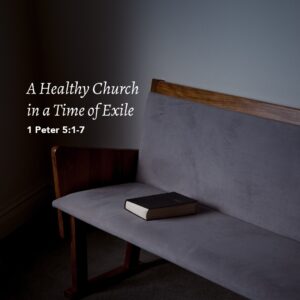1 Peter 5:1-7: A Healthy Church in a Time of Exile
October 24, 2023
TODAY'S BIBLE READING:
Lamentations 3, Song of Solomon 8:1-7, John 7:14-24, 1 Peter 5:1-7

How should the church function when it is sensing that the world around is unfriendly towards, even antagonistic towards, the Christian faith? Here in this section, Peter first addresses elders, then the younger members of the church, and then collectively all together.
First, the elders.
- Note that Peter regards himself as a “fellow elder.” What humility! There was a lot more that Peter could have said about himself. Apostle. One of the great heroes of the early church. And yet he starts his instruction to elders by calling himself a fellow elder. All those who serve as pastors would do well not to elevate themselves beyond the level to which Peter elevates himself! He too is merely a fellow elder. But of course he is more than that too: he is a “witness of Christ’s sufferings.” He is reminding his readers of his authority as an apostle. On this basis he is making his appeal: this is important.
- Note the three words that are used interchangeably of the elders: elder, shepherd and overseer. Church history has given different names to these three words drawn from the original language: elder (or presbyter), shepherd (or pastor), overseer (or bishop). But according to Peter, elders are all three: elder, overseer, shepherd.
- Elders are to serve willingly, without thought of financial gain, eager to serve, not lording it over those entrusted to them, but as examples to the flock. Peter is surely reflecting Jesus’ teaching about leadership: the greatest among you is to be servant of all. Our role, those of us who are elders or leaders, is to serve. That does not mean that we are pushovers! But it does mean that our agenda is for the good of those around (not the enrichment or aggrandizement of ourselves). The flesh pushes back against serving, but to lead well in the church of Christ, we must push into service and more service.
- And then note the motivation. All this is a heavy task. Often thankless. Increasingly disparaged as all authority is chafed against by the culture around. Rarely rewarded here. Why do it? “When the Chief Shepherd appears you will receive the crown of glory that will never fade away.” Pastor, elder, overseer: focus on that crown!
Second, the youngers. Similarly, or in the same way, Peter says, you who are younger are to submit to the elders. There is an answering pattern of godly eldering and shepherding that comes from a godly following and submitting. A church that will not submit to leadership will not long be healthy. Our positions as followers is to follow: not naively (for we must test the spirits and there are false teachers) but humbly and graciously. When the elders and pastors lead from a direction that is demonstrably from God’s Word, godly followers follow joyfully- even if it is not their preference or personal desire.
Third, all together. Throughout a healthy church, there is one overriding principle: humility. We are to clothe ourselves with humility towards one another. How different is this advice from that of contemporary pop psychology! Peter does not say act as you feel, discover who you are, and then do what comes naturally to you. Instead, we are to clothe – put on, act as if – we are like Christ in his humility so being humble towards one another.
Why? “God opposes the proud but shows favor to the humble.”
There could be no more practical reason. Humility does not run counter to common sense, it is godly common sense in practice. Peter quotes from that very practical book, the Book of Proverbs, to demonstrate that humility is the practical path because God shows favor to the humble.
And then he concludes with two stunning pieces of practical pastoral counsel to us all – each of which deserve at least one sermon (if not a whole book) to explain and apply:
One:
“Humble yourselves, therefore, under God’s mighty hand, that he may lift you up in due time.”
If you are sensing that you are down, disconsolate, discouraged: humble yourself under God’s mighty hand that in due course he might lift you up.
Two:
“Cast all your anxiety on him because he cares for you.”
If you are anxious, actively and consciously push that anxiety onto God in prayer. He cares for you.
ABOUT THE AUTHOR
Josh Moody (Ph.D., University of Cambridge) is the senior pastor of College Church in Wheaton, IL., president and founder of God Centered Life Ministries, and author of several books including How the Bible Can Change Your Life and John 1-12 For You.
WANT MORE?
To receive God Centered Life devotionals directly in your inbox, as well as other resources, enter your email address in the form at the bottom of this page and click "subscribe."

